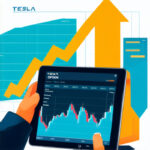1 Share of Tesla: Insights on Value, Growth, and Future Prospects

Introduction to Tesla’s Market Position
Tesla, Inc. has firmly positioned itself as a pioneering force in the automotive industry, particularly in the realm of electric vehicles (EVs). Founded in 2003 by Martin Eberhard and Marc Tarpenning, with Elon Musk joining shortly thereafter, Tesla has grown from a niche player into a global powerhouse. The company’s commitment to sustainable energy solutions and cutting-edge technology has garnered significant attention from both consumers and investors alike. Understanding the significance of owning 1 share of Tesla offers insight into the company’s dynamic market presence and the influence it wields in shaping the future of transportation and energy.
Overview of Tesla’s Company Background
Tesla’s journey began with the goal of accelerating the world’s transition to sustainable energy. The company introduced its first car, the Roadster, in 2008, which set the foundation for its future endeavors. Since then, Tesla has expanded its lineup to include the Model S, Model 3, Model X, and Model Y, each contributing to its reputation for innovation. Tesla’s vision extends beyond vehicles, as it also delves into energy storage solutions and solar products. This holistic approach to renewable energy has allowed Tesla to diversify its offerings and strengthen its market position across various sectors.
Significance of 1 Share of Tesla in the Market
Owning a single share of Tesla represents more than just a stake in an automaker; it symbolizes a piece of a revolutionary movement towards sustainable energy. Tesla’s shares have become a barometer for investor sentiment in the green energy sector. As of recent years, Tesla’s stock has been a hot topic on Wall Street, reflecting both the company’s growth potential and inherent risks. For investors, 1 share of Tesla is a gateway to participating in the broader narrative of technological advancement and environmental consciousness, making it a coveted asset in today’s investment portfolios.
Historical Context and Market Influence
Historically, Tesla has been a disruptor in the automotive industry. Its early adoption of electric vehicles challenged traditional automakers, pushing the entire industry towards electrification. Tesla’s market influence extends to its innovative direct-to-consumer sales model and advanced driver-assist technologies. Over the years, Tesla’s stock has experienced significant volatility, often reflecting broader market trends and investor perceptions of its growth prospects. This historical context is crucial for understanding the current valuation of 1 share of Tesla and the factors that have shaped its journey from a niche startup to a market leader.
Current Valuation of 1 Share of Tesla
The current valuation of 1 share of Tesla is a reflection of various market dynamics and investor sentiments. As of the latest trading sessions, Tesla’s stock price has witnessed fluctuations, attributed to factors such as market conditions, company announcements, and broader economic indicators. Tesla’s valuation is often benchmarked against key players in the automotive and tech industries, highlighting its unique position at the intersection of innovation and sustainability. Investors keen on understanding Tesla’s value must consider these elements, as they play a pivotal role in shaping the trajectory of the company’s stock price.
Latest Trading Prices and Trends
Recent trading activity for Tesla’s stock has shown a pattern of highs and lows, reflective of its volatile nature. Investors closely watch these trends, which can be influenced by quarterly earnings reports, product announcements, and shifts in market sentiment. Tesla’s ability to outperform expectations often results in upward price movements, while market corrections can lead to declines. Understanding these trading patterns is essential for investors considering purchasing 1 share of Tesla, as it provides insight into the potential risks and rewards associated with investing in a company known for its dynamic market presence.
Factors Influencing Tesla’s Stock Price
Several factors influence Tesla’s stock price, including its financial performance, technological advancements, and macroeconomic conditions. Earnings reports that exceed expectations typically boost investor confidence, leading to stock price increases. Innovations in battery technology and autonomous driving also play a crucial role in shaping Tesla’s market perception. Additionally, external factors such as government regulations, competition, and global economic trends can impact Tesla’s valuation. Investors must weigh these variables when assessing the potential and risks of holding 1 share of Tesla, as they collectively contribute to the company’s market dynamics.
Comparison with Other Key Players in the Industry
When comparing Tesla to other key players in the automotive industry, its unique business model and focus on innovation set it apart. While traditional automakers like Ford and General Motors have made strides in the EV space, Tesla’s early entry and technological advancements give it a competitive edge. Furthermore, Tesla’s market capitalization often rivals or surpasses these established brands, underscoring its influence. For investors, understanding these comparisons highlights why 1 share of Tesla can be seen as a valuable asset, particularly for those interested in the future of transportation and sustainable energy solutions.
Growth Trajectory of Tesla
Tesla’s growth trajectory is characterized by its rapid expansion and constant pursuit of innovation. From its humble beginnings, Tesla has evolved into a global entity with a significant production footprint. The company has consistently pushed boundaries, setting ambitious targets for vehicle production and delivery. This growth mindset is evident in its expansion into international markets and its investments in Gigafactories worldwide. Investors interested in 1 share of Tesla must consider this trajectory, as it provides a glimpse into the company’s potential to reshape the automotive industry and its ability to achieve sustained growth over the long term.
Overview of Tesla’s Historical Growth Patterns
Tesla’s historical growth patterns reflect its commitment to achieving milestones that redefine industry standards. The company has consistently reported year-over-year growth in vehicle deliveries, reflecting strong consumer demand for its products. Tesla’s ability to scale production, particularly with the launch of new models, has been a key driver of its success. Its focus on vertical integration, from battery production to vehicle assembly, has allowed Tesla to maintain control over its supply chain, ensuring efficiency and quality. These growth patterns highlight the potential value of 1 share of Tesla, as the company continues to expand its market reach.
Key Milestones in Tesla’s Expansion
Tesla’s expansion is marked by several key milestones that have solidified its position as an industry leader. The opening of Gigafactories in Nevada, Shanghai, and Berlin represents Tesla’s commitment to scaling production and meeting global demand. The successful launch of the Model 3, which became a best-seller in multiple markets, demonstrated Tesla’s ability to produce mass-market vehicles. In addition, Tesla’s foray into energy storage with products like Powerwall and Solar Roof has diversified its revenue streams. These milestones underscore the growth potential of 1 share of Tesla, as the company continues to innovate and expand its global footprint.
Innovations Driving Tesla’s Growth
Innovations are at the heart of Tesla’s growth strategy, with the company consistently pushing the envelope in automotive technology. Its advancements in battery technology have extended the range and efficiency of electric vehicles, making them more appealing to consumers. Tesla’s development of Autopilot and Full Self-Driving features highlights its commitment to leading in autonomous vehicle technology. The company’s focus on renewable energy solutions, such as solar panels and energy storage systems, further exemplifies its innovative approach. These innovations contribute to the allure of 1 share of Tesla, as they position the company at the forefront of multiple industries.
Analyzing the Financial Health of Tesla
Analyzing Tesla’s financial health involves examining its earnings reports, financial statements, and key ratios. The company has achieved notable profitability in recent years, driven by increased vehicle production and sales. Tesla’s strong cash flow and strategic investments in infrastructure and technology support its growth ambitions. Key financial metrics, such as revenue growth and operating margins, provide insight into Tesla’s operational efficiency. Investor confidence in Tesla’s financial health is a critical factor influencing the value of 1 share of Tesla, as it reflects the company’s ability to sustain growth and navigate competitive market conditions.
Recent Earnings Reports and Financial Statements
Tesla’s recent earnings reports have showcased its ability to achieve profitability while expanding its production capabilities. The company’s revenue growth has been driven by increased vehicle deliveries and the expansion of its energy products division. Tesla’s financial statements highlight its strategic investments in research and development, which are crucial for maintaining its competitive edge. Despite supply chain challenges, Tesla has managed to maintain healthy margins, underscoring its operational resilience. Investors considering 1 share of Tesla should review these earnings reports to assess the company’s financial performance and its potential to deliver sustained growth in the future.
Key Financial Ratios and Metrics
Key financial ratios and metrics provide valuable insight into Tesla’s financial health and operational efficiency. Metrics such as the price-to-earnings (P/E) ratio, return on equity (ROE), and debt-to-equity ratio offer a snapshot of Tesla’s valuation and financial stability. Tesla’s P/E ratio, often higher than industry averages, reflects growth expectations and investor optimism. The company’s ROE indicates its ability to generate profit from shareholders’ equity, while the debt-to-equity ratio assesses financial leverage. Analyzing these metrics helps investors understand the potential risks and rewards associated with owning 1 share of Tesla, guiding informed investment decisions.
Investor Confidence and Market Sentiment
Investor confidence and market sentiment play a significant role in shaping Tesla’s stock performance. Positive sentiment is often driven by the company’s strong financial results, technological innovations, and strategic initiatives. Tesla’s ability to meet or exceed market expectations can lead to increased investor confidence, driving stock prices higher. Conversely, market uncertainties and external factors, such as regulatory challenges or economic downturns, can impact sentiment and lead to volatility. For those considering 1 share of Tesla, understanding the interplay between investor confidence and market sentiment is crucial for assessing the stock’s potential trajectory and associated risks.
Future Prospects for 1 Share of Tesla
The future prospects for 1 share of Tesla are influenced by the company’s ongoing innovation, market expansion, and strategic initiatives. Tesla is poised to introduce new products and technologies, such as the highly anticipated Cybertruck and advancements in autonomous driving. Additionally, the company’s expansion into emerging markets and efforts to increase production capacity signal growth opportunities. However, potential challenges, including competition and regulatory hurdles, must be considered. Investors interested in Tesla’s future should assess these factors, as they provide insight into the potential value and risks associated with owning a stake in this pioneering company.
Upcoming Technological Innovations and Products
Tesla’s commitment to technological innovation continues to drive its future prospects. Upcoming products, such as the Cybertruck and the next-generation Roadster, are expected to capture consumer interest and expand Tesla’s market reach. The company’s focus on improving battery technology aims to enhance vehicle performance and reduce costs, further solidifying Tesla’s leadership in the EV space. Additionally, Tesla’s advancements in autonomous driving technology, including Full Self-Driving capabilities, represent significant growth opportunities. These innovations contribute to the allure of 1 share of Tesla, as they position the company to capitalize on emerging trends and redefine industry standards.
Expansion Plans and Market Penetration Strategies
Tesla’s expansion plans and market penetration strategies are integral to its growth narrative. The company’s efforts to increase production capacity through Gigafactories in strategic locations aim to meet rising global demand. Tesla’s entry into emerging markets, such as India and Southeast Asia, presents new opportunities for growth and diversification. Additionally, Tesla’s focus on enhancing its sales and service network supports its expansion objectives. Investors considering 1 share of Tesla should evaluate these strategies, as they highlight the company’s commitment to scaling operations and strengthening its competitive position in the rapidly evolving automotive and energy sectors.
Potential Challenges and Risks
While Tesla’s prospects are promising, potential challenges and risks must be considered. The automotive industry is highly competitive, with traditional automakers ramping up their EV efforts. Regulatory changes, particularly those related to emissions and safety standards, could impact Tesla’s operations. Supply chain disruptions and raw material shortages may also pose challenges. Additionally, Tesla’s stock is known for its volatility, influenced by market sentiment and external factors. Investors contemplating 1 share of Tesla should weigh these risks against the company’s growth potential, ensuring a balanced approach to investment that accounts for both opportunities and uncertainties.
Investment Considerations for 1 Share of Tesla
Investing in 1 share of Tesla involves weighing the benefits and risks associated with the company’s dynamic market presence. Tesla’s strong brand recognition, innovative products, and commitment to sustainability make it an attractive investment for those seeking exposure to the EV and renewable energy sectors. However, potential investors must consider the stock’s volatility and the competitive landscape. Long-term investors may benefit from Tesla’s growth trajectory, while short-term investors should be prepared for price fluctuations. Understanding these considerations is essential for making informed decisions about investing in Tesla, ensuring alignment with individual financial goals and risk tolerance.
Benefits of Investing in Tesla
Investing in Tesla offers several benefits, particularly for those interested in the future of sustainable energy and transportation. Tesla’s reputation for innovation and its track record of disrupting traditional markets make it a compelling choice for growth-oriented investors. The company’s expansion into new products and markets presents opportunities for revenue diversification and long-term value creation. Additionally, Tesla’s focus on environmental sustainability aligns with the values of socially conscious investors. For those considering 1 share of Tesla, these benefits underscore the potential for significant returns, provided investors are prepared to navigate the inherent risks associated with the stock’s volatility.
Risks Associated with Tesla’s Volatility
While Tesla offers compelling growth prospects, its stock is known for its volatility, presenting risks that investors must consider. Market sentiment and external factors, such as regulatory changes and economic shifts, can lead to price fluctuations. Tesla’s competitive environment, with traditional automakers entering the EV market, presents additional challenges. Supply chain disruptions and production delays may also impact Tesla’s performance. Investors contemplating 1 share of Tesla should be prepared for potential short-term volatility and ensure that their investment strategy aligns with their risk tolerance and financial goals, balancing the allure of potential returns with the possibility of market uncertainties.
Long-term vs. Short-term Investment Strategies
When investing in 1 share of Tesla, investors must consider their investment horizon and strategy. Long-term investors may focus on Tesla’s growth potential and its commitment to innovation, viewing short-term volatility as an opportunity to accumulate shares at favorable prices. This approach aligns with those who believe in Tesla’s ability to disrupt industries and create long-term value. Conversely, short-term investors may seek to capitalize on price fluctuations, leveraging market trends and sentiment. Understanding the differences between these strategies is critical for aligning investment decisions with individual financial objectives, ensuring a balanced approach to managing Tesla’s stock in a dynamic market environment.
Conclusion and Final Thoughts
In conclusion, 1 share of Tesla represents a unique opportunity to invest in a company at the forefront of innovation and sustainability. Tesla’s market potential is driven by its commitment to advancing electric vehicles, renewable energy solutions, and autonomous driving technologies. While the stock’s volatility presents challenges, Tesla’s growth trajectory and strategic initiatives offer promising prospects for long-term investors. Personal insights suggest that a balanced investment approach, considering both the benefits and risks, is essential when investing in Tesla. As the company continues to redefine industry standards, its future outlook remains optimistic, making Tesla a compelling consideration for forward-thinking investors.

Laura Henderson is an enthusiast and has been writing on cutting-edge topics for years.







